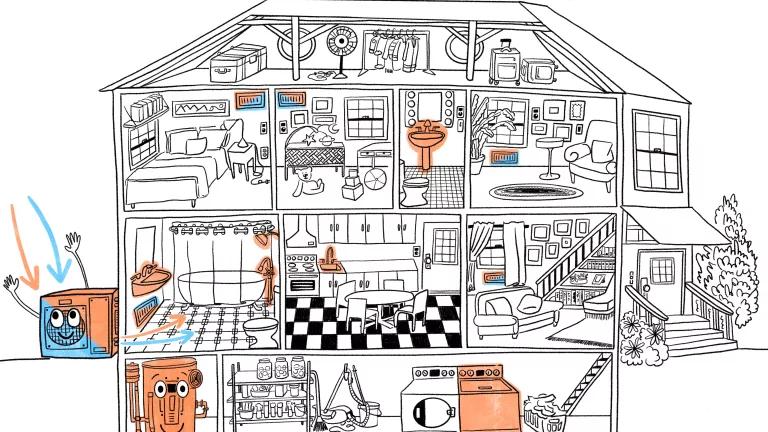Clean Energy Homes: An Easy 'Yes' for Californians

Given a choice between clean electricity or fossil (a.k.a. “natural”) gas to power home appliances, Californians overwhelmingly choose renewable power by a 48-point margin. The results of a survey of 1,000 California voters released this month confirm that switching to clean electricity for home heating and hot water isn't just a policy tool to address climate change—it's a transition that voters broadly support because they recognize the health, safety, and economic benefits.
Remarkably, 70 percent of respondents in the January survey of California voters said they would prefer appliances that run on electricity that is increasingly being generated from clean and renewable sources, even though most currently have gas appliances and many are largely unaware of the available alternatives.
More than three in five people in the study, which was conducted by Fairbank, Maslin, Maullin, Metz & Associates (FM3), said they were unfamiliar with heat pump appliances such as water heaters or space heaters. And just 53 percent were "somewhat familiar" with induction cookstoves.
A clean energy home movement
California residents soon will be a lot more familiar with these options as many cities, regional air quality management districts, and the state itself make a push to reduce toxic air pollution and greenhouse gas emissions from homes and businesses by reducing the use of fossil fuels for heating and hot water within our buildings. In an important decision earlier this year, the California Public Utilities Commission voted unanimously to allocate nearly $45 million toward boosting highly efficient electric heat pump water heaters that can also act as clean energy batteries. And across the state, nearly 30 cities are implementing building codes to promote clean, all-electric buildings. These policies accompany an updated statewide building code, effective at the start of the year, that requires all new single-family homes and low-rise apartment buildings to have increased efficiency, along with dedicated onsite or community-based solar power.
The FM3 survey confirms strong support for policies that can advance building “decarbonization” (transitioning from appliances running on fossil fuels), such as workforce training and development (81 percent support), rebates or incentives for advanced electric appliances (77 percent support), and updated electricity rates that encourage the use of renewable energy (75 percent support).
Other measures that drew support from at least 65 percent or more respondents included financing programs to help families upgrade to energy-efficient electric appliances and equipment, policies that prioritize getting clean energy to low-income households, and a statewide goal to reduce building pollution that aligns with California's climate targets.
Helping improve housing affordability
Modern heat pump technology is three to five times more efficient than incumbent gas alternatives, leading to lower utility bills when choosing high-efficiency equipment. All-electric homes also don’t need gas plumbing, making them cheaper and faster to build than gas-heated homes. Clean electric heating is an important opportunity to address survey respondents’ desire for lower energy bills (70 percent) and the state and the governor’s priority to solve California’s housing affordability crisis.
Cutting pollution
Switching to highly efficient appliances that run on increasingly clean power is a potent tool for reducing planet-warming emissions from buildings. Replacing a gas furnace or water heater today with electric heat pump models would slash annual emissions for household water and space heating by approximately half, and more as the electric grid continues to get cleaner over time.
But all-electric buildings offer a host of benefits beyond just mitigating climate change, and these resonate with Californians. More than half of survey respondents marked eight goals that can be achieved through building decarbonization as extremely or very important. "Reducing the risk of gas leaks, fires, and explosions" ranked at the top (77 percent). Other goals, in order of recognized importance, were: improving energy efficiency; lowering energy bills; improving public health by reducing air pollution; reducing the carbon pollution that causes climate change; reducing indoor air pollution; providing opportunities for new jobs in energy efficiency and electric appliance installation; and helping to meet the state goal of 100 percent renewable electricity by 2045.
The fact that Americans have gotten used to polluting home-heating equipment and appliances doesn't mean they won't embrace a better option. This study confirms most voters are not opposed to switching from gas to clean electricity. In fact, they're waiting for the opportunity.



